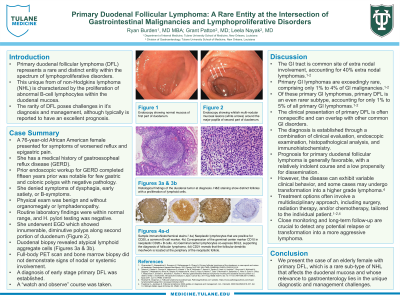Sunday Poster Session
Category: Small Intestine
P1311 - Primary Duodenal Follicular Lymphoma: A Rare Entity at the Intersection of Gastrointestinal Malignancies and Lymphoproliferative Disorders
Sunday, October 22, 2023
3:30 PM - 7:00 PM PT
Location: Exhibit Hall

Has Audio

Ryan Burden, MD
Tulane University School of Medicine
New Orleans, LA
Presenting Author(s)
Ryan Burden, MD1, Grant Patton, MD1, Leela Nayak, MD2
1Tulane University School of Medicine, New Orleans, LA; 2VA Southeast Louisiana Healthcare, New Orleans, LA
Introduction: Primary duodenal follicular lymphoma (DFL) represents an exceedingly rare and distinct entity within the spectrum of lymphoproliferative disorders. This unique form of non-Hodgkin lymphoma (NHL) is characterized by the proliferation of abnormal B-cell lymphocytes within the duodenal mucosa, making it an uncommon subtype of gastrointestinal malignancy. The rarity of DFL poses challenges in its diagnosis and management.
Case Description/Methods: A 76-year-old African American female with a medical history of GERD presented with symptoms of worsened reflux and epigastric pain. Prior endoscopic workup for GERD completed greater than fifteen years ago was notable for small gastric and colonic polyps with reported negative pathology. She denied dysphagia, early satiety, or B symptoms. Physical exam was benign and without evidence of organomegaly or lymphadenopathy. All laboratory findings were within reference range. H. pylori was negative. She underwent an EGD which showed innumerable diminutive polyps carpeting the surface of the second and third portion of the duodenum. Biopsy of these polyps revealed an atypical lymphoid aggregate composed of small centrocytes with positive CD20, CD10, BCL-2, and BCL-6 markers. Full-body PET scan and bone marrow biopsy did not show evidence of nodal or systemic involvement. A diagnosis of early stage primary DFL was established. A “watch and observe” course was taken with annual labs and surveillance imaging.
Discussion: Primary GI lymphomas are exceedingly rare, comprising only 1% to 4% of GI malignancies. Of these primary GI lymphomas, primary DFL is an even rarer subtype, accounting for only 1% to 5% of all primary GI lymphomas. The clinical presentation of primary DFL is often nonspecific and can overlap with other common GI disorders. The diagnosis is established through a combination of clinical evaluation, endoscopic examination, histopathological analysis, and immunohistochemistry. Prognosis for primary duodenal follicular lymphoma is generally favorable, with a relatively indolent course and a low propensity for dissemination. However, the disease can exhibit variable clinical behavior, and some cases may undergo transformation into a higher grade lymphoma. Treatment options often involve a multidisciplinary approach, including surgery, radiation therapy, and/or chemotherapy, tailored to the individual patient. Close monitoring and long-term follow-up are crucial to detect any potential relapse or transformation into a more aggressive lymphoma.
Disclosures:
Ryan Burden, MD1, Grant Patton, MD1, Leela Nayak, MD2. P1311 - Primary Duodenal Follicular Lymphoma: A Rare Entity at the Intersection of Gastrointestinal Malignancies and Lymphoproliferative Disorders, ACG 2023 Annual Scientific Meeting Abstracts. Vancouver, BC, Canada: American College of Gastroenterology.
1Tulane University School of Medicine, New Orleans, LA; 2VA Southeast Louisiana Healthcare, New Orleans, LA
Introduction: Primary duodenal follicular lymphoma (DFL) represents an exceedingly rare and distinct entity within the spectrum of lymphoproliferative disorders. This unique form of non-Hodgkin lymphoma (NHL) is characterized by the proliferation of abnormal B-cell lymphocytes within the duodenal mucosa, making it an uncommon subtype of gastrointestinal malignancy. The rarity of DFL poses challenges in its diagnosis and management.
Case Description/Methods: A 76-year-old African American female with a medical history of GERD presented with symptoms of worsened reflux and epigastric pain. Prior endoscopic workup for GERD completed greater than fifteen years ago was notable for small gastric and colonic polyps with reported negative pathology. She denied dysphagia, early satiety, or B symptoms. Physical exam was benign and without evidence of organomegaly or lymphadenopathy. All laboratory findings were within reference range. H. pylori was negative. She underwent an EGD which showed innumerable diminutive polyps carpeting the surface of the second and third portion of the duodenum. Biopsy of these polyps revealed an atypical lymphoid aggregate composed of small centrocytes with positive CD20, CD10, BCL-2, and BCL-6 markers. Full-body PET scan and bone marrow biopsy did not show evidence of nodal or systemic involvement. A diagnosis of early stage primary DFL was established. A “watch and observe” course was taken with annual labs and surveillance imaging.
Discussion: Primary GI lymphomas are exceedingly rare, comprising only 1% to 4% of GI malignancies. Of these primary GI lymphomas, primary DFL is an even rarer subtype, accounting for only 1% to 5% of all primary GI lymphomas. The clinical presentation of primary DFL is often nonspecific and can overlap with other common GI disorders. The diagnosis is established through a combination of clinical evaluation, endoscopic examination, histopathological analysis, and immunohistochemistry. Prognosis for primary duodenal follicular lymphoma is generally favorable, with a relatively indolent course and a low propensity for dissemination. However, the disease can exhibit variable clinical behavior, and some cases may undergo transformation into a higher grade lymphoma. Treatment options often involve a multidisciplinary approach, including surgery, radiation therapy, and/or chemotherapy, tailored to the individual patient. Close monitoring and long-term follow-up are crucial to detect any potential relapse or transformation into a more aggressive lymphoma.
Disclosures:
Ryan Burden indicated no relevant financial relationships.
Grant Patton indicated no relevant financial relationships.
Leela Nayak indicated no relevant financial relationships.
Ryan Burden, MD1, Grant Patton, MD1, Leela Nayak, MD2. P1311 - Primary Duodenal Follicular Lymphoma: A Rare Entity at the Intersection of Gastrointestinal Malignancies and Lymphoproliferative Disorders, ACG 2023 Annual Scientific Meeting Abstracts. Vancouver, BC, Canada: American College of Gastroenterology.

